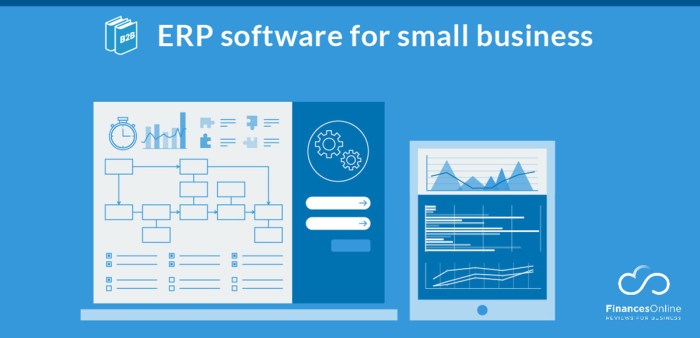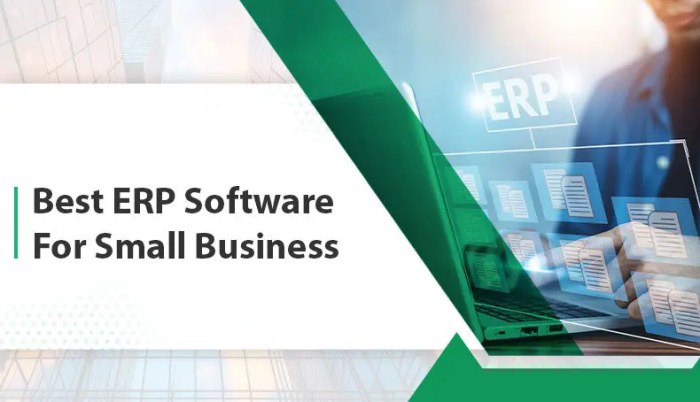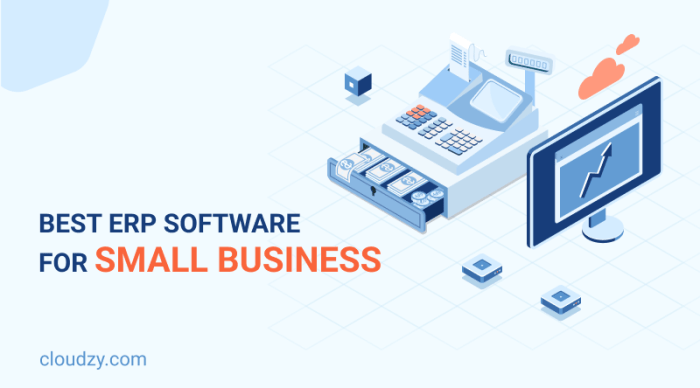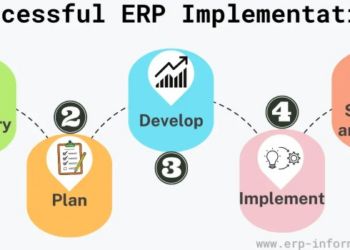Embarking on the journey of ERP software for small business, this narrative unfolds with a unique charm, captivating readers with a promising storyline that is both informative and engaging.
Delving deeper into the realm of ERP software for small businesses, this article aims to provide a comprehensive understanding of the topic, shedding light on its significance and practical applications.
Introduction to ERP Software for Small Business
ERP (Enterprise Resource Planning) software is a powerful tool that integrates various business functions into a single system, allowing small businesses to manage and streamline their operations efficiently.
Importance of ERP Software for Small Businesses
- Centralized Data: ERP software centralizes data from different departments, providing a unified view of the business.
- Improved Efficiency: By automating processes and workflows, ERP software helps small businesses operate more efficiently.
- Enhanced Decision-Making: With real-time data and analytics, ERP software enables informed decision-making for small business owners.
How ERP Software Can Streamline Business Processes
- Inventory Management: ERP software helps small businesses optimize inventory levels and reduce carrying costs.
- Financial Management: From invoicing to budgeting, ERP software streamlines financial processes for small businesses.
- Customer Relationship Management: ERP software centralizes customer data and interactions, improving customer service and satisfaction.
Popular ERP Software Options for Small Businesses
| ERP Software | Key Features |
|---|---|
| NetSuite | Cloud-based, comprehensive ERP solution with modules for finance, HR, CRM, and more. |
| Microsoft Dynamics 365 | Scalable ERP software suite offering modules for financials, sales, marketing, and customer service. |
| QuickBooks Enterprise | ERP software tailored for small businesses, with features for accounting, inventory, and reporting. |
Key Features of ERP Software for Small Business
ERP software for small businesses comes with a variety of features that can help streamline operations and improve efficiency. Here are some key features that small businesses should look for when choosing an ERP solution:
Automation Benefits
- Automated data entry and processing to reduce manual errors and save time.
- Automated workflows for approval processes, notifications, and reminders.
- Automated inventory management to optimize stock levels and reduce carrying costs.
Reporting and Analytics
- Customizable reports and dashboards to track key performance indicators (KPIs).
- Real-time data analytics for informed decision-making and forecasting.
- Integration with business intelligence tools for deeper insights into business operations.
Cloud-Based vs. On-Premise Solutions
- Cloud-based ERP solutions offer scalability, flexibility, and accessibility from anywhere with an internet connection.
- On-premise ERP solutions provide greater control over data security and customization options.
- Consider cost implications, maintenance requirements, and data storage needs when choosing between the two options.
Implementation of ERP Software for Small Business

Implementing ERP software for a small business can be a complex process that requires careful planning and execution. Below are the key steps involved in implementing ERP software for small businesses, common challenges faced during implementation, tips for successful implementation, and real-life examples of successful ERP software implementation stories.
Steps Involved in Implementing ERP Software for Small Business
- 1. Planning: Define the objectives, scope, and requirements of the ERP system.
- 2. Selection: Choose the right ERP software that aligns with your business needs.
- 3. Customization: Tailor the ERP software to meet specific business processes and workflows.
- 4. Training: Provide comprehensive training to employees on how to use the ERP system effectively.
- 5. Testing: Conduct thorough testing to ensure the ERP software functions as intended.
- 6. Deployment: Roll out the ERP software across the organization in a phased approach.
- 7. Monitoring: Continuously monitor and evaluate the ERP system to identify areas for improvement.
Common Challenges Faced During ERP Software Implementation
- - Resistance to Change: Employees may resist adopting new processes and technologies.
- - Data Migration Issues: Transferring data from existing systems to the ERP software can be challenging.
- - Lack of Top Management Support: Without leadership buy-in, ERP implementation may face roadblocks.
- - Budget Overruns: Unexpected costs during implementation can strain financial resources.
Tips for Successful ERP Software Implementation in Small Businesses
- - Involve Stakeholders: Engage employees at all levels to ensure buy-in and successful adoption.
- - Set Clear Goals: Define measurable objectives to track the success of the ERP implementation.
- - Provide Adequate Training: Invest in comprehensive training to empower employees to use the ERP system effectively.
- - Monitor Progress: Regularly assess the performance of the ERP system and make necessary adjustments.
Real-Life Examples of Successful ERP Software Implementation Stories
- - Company X streamlined its business processes and improved efficiency by implementing an ERP system that integrated all departments.
- - Small Business Y saw a significant increase in productivity and profitability after deploying an ERP solution that optimized inventory management.
Cost Considerations for ERP Software in Small Business

Implementing ERP software for small businesses involves several costs that need to be carefully considered to ensure a successful and cost-effective implementation. Let's break down the typical costs associated with adopting ERP software for small businesses and explore the ROI of investing in this technology.
Breakdown of Costs
- Licensing Fees: Small businesses need to pay licensing fees to use ERP software, which can vary based on the number of users and the features included.
- Implementation Costs: This includes costs related to customization, data migration, training, and support during the implementation phase.
- Hardware and Infrastructure: Small businesses may need to invest in new hardware or infrastructure to support the ERP software, such as servers or cloud services.
- Maintenance and Support: Ongoing maintenance and support costs are essential to ensure the smooth operation of the ERP system.
ROI of Investing in ERP Software
- Improved Efficiency: ERP software streamlines business processes, reduces manual tasks, and improves productivity, leading to cost savings in the long run.
- Better Decision-Making: Access to real-time data and analytics through ERP software enables small businesses to make informed decisions, boosting profitability.
- Enhanced Customer Service: ERP software helps small businesses deliver better customer service, leading to increased customer satisfaction and retention.
Scalability and Cost
Scalability is a crucial factor in the cost of ERP software for small businesses. Choose a solution that can grow with your business to avoid costly upgrades or migrations in the future.
Cost-Effective Strategies
- Cloud-Based Solutions: Opting for cloud-based ERP software can reduce upfront costs and provide flexibility in scaling resources as needed.
- Vendor Negotiations: Small businesses can negotiate with ERP vendors for discounts, flexible payment terms, or bundled services to lower overall costs.
- Training and Support: Investing in comprehensive training for employees and prioritizing ongoing support can prevent costly errors and maximize the ROI of ERP software.
Final Wrap-Up

Concluding this discussion on ERP software for small businesses, we have explored key aspects such as implementation, cost considerations, and essential features, offering a well-rounded view of how this technology can revolutionize small business operations.
Expert Answers
What are the primary benefits of implementing ERP software for small businesses?
ERP software can streamline operations, improve efficiency, enhance decision-making, and provide real-time insights for small businesses.
How can small businesses ensure successful ERP software implementation?
Small businesses can ensure success by thorough planning, employee training, selecting the right software, and continuous monitoring and evaluation.
What factors should small businesses consider when choosing between cloud-based and on-premise ERP solutions?
Small businesses should consider factors like cost, scalability, data security, and IT infrastructure when deciding between cloud-based and on-premise ERP solutions.










